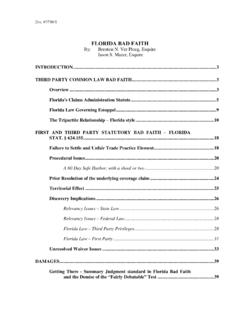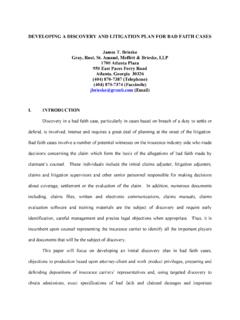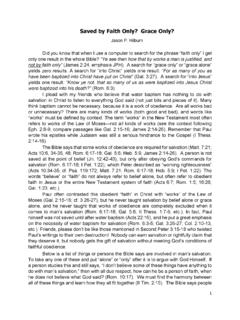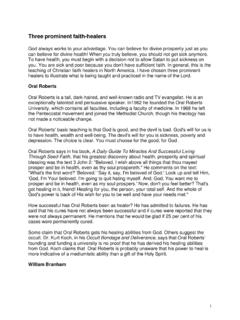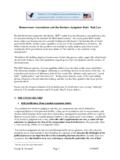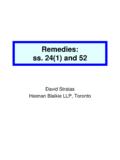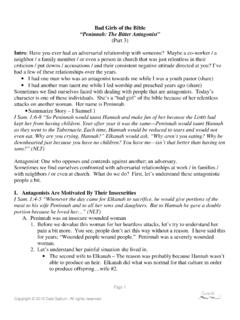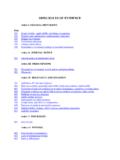Transcription of HARVEY KRUSE, P.C. BAD FAITH
1 HARVEY KRUSE, BAD FAITH . Prepared By: Michael F. Schmidt P25213. HARVEY KRUSE, 1050 Wilshire Drive, Suite 320. Troy, MI 48084. (248) 649-7800. Fax (248) 649-2316. A. INTRODUCTION. Subject to specific policy terms and conditions, insurers have a contractual duty to defend and indemnify their insured. Implicit in that contractual relationship is an insurer's duty of good FAITH and fair dealing. Accordingly, when an insured believes he has been wronged, he may attempt to bring suit alleging both breach of contract and bad FAITH . This outline will briefly address the two basic factual scenarios in which claims of bad- FAITH arise.
2 The first scenario arises when an insurer fails to settle a claim against its insured within policy limits, thereby exposing the insured to excess liability. As discussed below, such failure-to-settle claims are actionable in Michigan. The second instance in which bad FAITH claims are commonly brought arises when an insurer fails to timely pay claims submitted by its insured. Recovery on such claims is governed by the "penalty interest" statute, MCL ; MSA , contained within Michigan's Uniform Trade Practices Act ("UTPA"), MCL et seq; MSA. et seq. Claims seeking damages under the UTPA commonly contain claims for various emotional damages in addition to those provided by the Act.
3 An independent cause of action for the bad FAITH breach of an insurance contract does not exist in Michigan. Accordingly, damages for mental distress are not recoverable absent an allegation and proof of tortious conduct existing independent of the breach. The most common independent tort alleged in an action alleging a bad FAITH breach of an insurance contract is intentional infliction of emotional distress. An award for such a claim, however, has not yet been upheld on appeal. 1. B. FAILURE TO SETTLE. 1. Existence of the Cause of Action An insurer owes its insured a duty of good FAITH . In fact, insurers are held to a "universally" high standard of good FAITH .
4 Frankenmuth Ins v Keeley, 433 Mich 525, 539. (1989), vacated in part, 436 Mich 375 (1990). Accordingly, Michigan has long recognized an insured's cause of action for the "bad FAITH " settlement of an insurance claim. Wakefield v Globe Indemnity Co, 246 Mich 645 (1929); Commercial Union Ins v Medical Protective Co, 426 Mich 109, 116 (1986). An insured has a direct cause of action against his insurer for breach of that duty which exposes him to excess liability. Wakefield, supra; Commercial Union, supra; Jones v Nat'l Emblem Ins Co, 436 F Supp 119 (ED Mich, 1977). 2. Excess Insurers are Subrogated to the Rights of the Insured The duty of good FAITH that runs to the insured arises from the contract between the insurer and the insured.
5 Commercial Union, supra at 111-112. Because no contract exists between a primary and excess insurers, no "good FAITH " duty arises between the insurers. In an attempt to remedy this situation, a majority of jurisdictions have recognized a cause of action based upon equitable subrogation. Equitable subrogation is a legal fiction though which a person who pays a debt for an individual who is primarily responsible, is substituted, or "subrogated," to all the rights and remedies of the primarily responsible individual. Id. at 117. Allowing excess insurers to be subrogated to the rights of an insured and allowing the excess carrier to enforce the duty to settle in good FAITH serves the public interest in encouraging fair and reasonable settlements and by discouraging primary carriers from "gambling" with an excess insurer's money when potential judgments approach the primary carrier's policy limits.
6 Id. 3. Defining Bad FAITH Although the existence of a cause of action for a bad FAITH failure to settle had been firmly established, conduct constituting "bad FAITH " was somewhat unclear until the Supreme Court's decision in Commercial Union Ins v Medical Protective Co, 426 Mich 109 (1986). In Commercial Union, the Court defined bad FAITH , for the purpose of instructing a jury, as "arbitrary, reckless, indifferent, or intentional disregard" of the interests of the insured. Id. at 136. In further explanation, the Court stated: Good- FAITH denials, offers of compromise, or other honest errors of judgment are not sufficient to establish bad FAITH .
7 Further, claims of bad FAITH cannot be based upon negligence or bad judgment, so long as the actions were made honestly and without concealment. However, because bad FAITH is a state of mind, there can be bad FAITH without actual dishonesty or fraud. If the insurer is motivated by selfish purpose or by a desire to protect is own interests at the expense of the insured's interest, bad FAITH exists, 2. even though the insurer's actions were not actually dishonest or fraudulent. Id. at 136-137. (footnotes omitted). In addition to providing the instructional definition of bad FAITH , the Court set forth twelve factors that a trier of fact may consider when determining the existence of bad FAITH .
8 The following factors are not exclusive and no single factor is intended to be decisive: 1.) Failure to keep the insured fully informed of all developments in a claim or suit that could reasonably affect the interests of the insurered. 2.) Failure to inform the insured of all settlement offers that do not fall within policy limits. 3.) Failure to solicit a settlement offer or initiate settlement negotiations when warranted by the circumstances. 4.) Failure to accept a reasonable compromise offer of settlement when the facts of the case or claim indicate obvious liability and serious injury. 5.) Rejection of a reasonable offer of settlement within policy limits.
9 6.) Undue delay in accepting a reasonable offer to settle a potentially dangerous case within policy limits where the verdict potential is high. 7.) An attempt by the insurer to coerce or obtain an involuntary contribution from the insured in order to settle within policy limits. 8.) Failure to make a proper investigation of the claim prior to refusing an offer of settlement within policy limits. 9.) Disregarding advice or recommendations of an adjuster or attorney. 10.) Serious and recurrent negligence by the insurer. 11.) Refusal to settle a case within policy limits following an excessive verdict when the chances of reversal on appeal are slight or doubtful.
10 12.) Failure to take an appeal following a verdict in excess of policy limits where there are reasonable grounds for such an appeal, especially where recommended by trial counsel. [Commercial Union, 426 Mich at 138-139.]. In applying these factors, it is important to remember that the conduct under scrutiny must be considered in light of the circumstances existing at the time. The factors are not to be reviewed with "20-20 hindsight." Id. at 139. 3. 4. Liability for Breach of the Duty of Good FAITH Settlement The measure of damages to an insured for an insurer's bad FAITH breach of its duty to settle can be difficult to ascertain.





